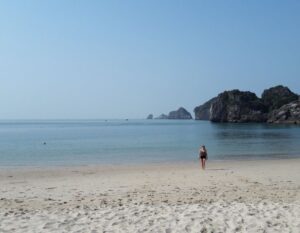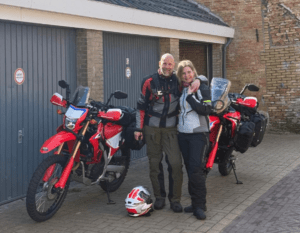Winter, not everyone’s favorite time to be in the Netherlands. While it gets darker and grayer here, the sun beckons in other places around the world. More and more people are choosing to spend the winter abroad. And with a remote job or online business, you can combine that with work just fine these days. But how do you arrange something like that? And where should you go? In this blog you will read how to exchange your winter for sun, sea and productive remote work days.
How does hibernating with a remote job work?
Wintering is nothing more than staying for a longer period, often one to four months, in a warm(er) country during the cold winter months in the Netherlands. Thanks to the rise of remote working, it is easier than ever to combine this with your job. This can be done in several ways:
- You already have a remote job and only need to bring your laptop.
- You request (temporary) remote work from your employer.
- You build an online income, for example, through freelance assignments, your own business, affiliate marketing or an e-commerce shop.
The prerequisite is that your work is online and location-independent, and that you are in an environment where you can work well: that is, with a stable Internet connection, a quiet place to work, and preferably an inspiring digital nomad community.


This is how I became a (part-time) digital nomad
When I started working remotely 8 years ago, I was still employed. I was an event manager at a marketing company. We had about 6 big events a year, which of course I had to attend and was ultimately responsible for, but in between I could work wherever I wanted. My employer was very easy about this. Sometimes I would go to Croatia for a week, and other times I would spend the winter in Spain for 3 months.
In my spare time, I started a blog about remote working. To share my experience and knowledge about it, because pre corona it was not that common, especially in salaried jobs. That blog grew rapidly, I started organizing workations and thus Working Remotely was born. For about 5 months I built my business in the evenings and weekends, very tough! But this gave me time to establish a stable foundation for my business. Then I took the step to become a full-time entrepreneur. By now 3.5 years ago.
How do you earn online if you don’t have a remote job (yet)?
Don’t have a remote job yet, but want to spend the winter abroad? Then you will need to generate an online income. Some common ways digital nomads do this:
- Freelance work (e.g., copywriting, web design, translation, marketing)
- Offering e-learning or coaching
- E-commerce/webshop
- Affiliate marketing or content creation (e.g., blogging, UGC or YouTube)
- Becoming a virtual assistant (VA)
Many of these activities can be learned relatively quickly through online courses & subject experts. I personally work with a number of experts who can help you get started well, often you get a nice discount through Working Remotely. Start on time, build a network and experience through platforms like Upwork, Fiverr or LinkedIn, and make sure you have enough assignments or clients before you leave. Start this well in advance, as it takes some time to get this right. Digital nomad you don’t become in a day.
What are the top 5 destinations to spend the winter as a digital nomad?
Where can you work well and enjoy the sun in the winter months? I have been escaping the Dutch winter for over 12 years now. Usually for 2 months, but sometimes longer. Below are five destinations that are popular among digital nomads and that I really like:
1. Tenerife, Canary Islands (Spain)
- 🌞 Average 22 degrees in winter
- 🇪🇺 Within the EU, no visa required
- 🧑💻 Increasingly coworking spaces and digital nomads
Tenerife has been a favorite among winter travelers for years. The island has good infrastructure, affordable accommodations and a growing remote community, especially in Puerto de la Cruz and Costa Adeje. I really loved it. As in Gran Canaria, for that matter.
2. Essaouira or Taghazout, Morocco
- ☀️ Sunny and dry from November to March
- 🧘♀️ Combine work with surfing or yoga
- 💸 Low cost of living.
Taghazout is a small surf and digital nomad hub on the Atlantic coast. Essaouira is a cultural coastal town with some hip cafes and cozy atmosphere in the medina. In both cities, the climate is mild to warm in winter. Definitely a must visit Morocco in winter. Find more tips on Morocco as a digital nomad destination here.
3. Madeira or Algarve, Portugal
- 🏞️ Spectacular nature and outdoor lifestyle
- 📡 Good internet connections
- 🚶♀️ Safe, clean and orderly
Madeira is an emerging remote work destination with coworking spaces in Funchal, after-hours hikes and year-round spring-like temperatures. The Algarve is also great for overwintering, with temperatures often just below 20 degrees.
4. Thailand (Chiang Mai or Koh Phangan), Asia
- ☀️ Dry and sunny in winter months
- 🧑💻 Large digital nomad community
- 🛵 Affordable and well-developed for remote working
Thailand has been a top destination for digital nomads for years and truly a beautiful country. In the winter months, it is dry and warm. Chiang Mai is known for its nice atmosphere, affordable costs and coworkings. Koh Phangan is ideal if you want to combine remote work with nature, beaches and a chill island feel. Find more tips on Thailand as a destination for remote work here.
5. Cape Town, South Africa
- 🌅 Summer in the Dutch winter
- 🏙️ Dynamic city with nature around the corner
- 🧑💻 Many cafes and coworking spots in the city
Cape Town offers a unique blend of mountains, beaches, culture and work facilities. The travel time is a bit longer, but the time difference is limited, very convenient for meetings with the Netherlands. In addition, you can combine it with a tour of South Africa, which I personally found really fantastic. Here you will find many more tips about South Africa for digital nomads.
Practical tips for wintering as a remote worker
- Check your work arrangements: Discuss with your employer or clients that you are temporarily working from abroad.
- Provide a good workspace: Book accommodation with a desk and stable wifi, book a desk in a coworking space or choose a coliving with remote workers.
- Arrange your insurance properly: Travel insurance does not always cover extended stays, check that carefully. Also look into international health insurance and coverage for your laptop and phone.
- Schedule your work routine: Take into account any time differences, focus blocks and adequate relaxation. You want to leave enough time to explore your destination without letting your work suffer.
- Join communities: Through Facebook groups, coworkings or platforms like Meetup, you can quickly find others locally. It can be great fun to meet other digital nomads.
Say goodbye to winter
Wintering abroad is no longer just for retirees. Thanks to remote working and the growth of online business models, working people in their twenties, thirties and forties can choose where to spend the winter. With good preparation and the right destination you can combine sun, adventure and productivity and leave the Dutch winter weather behind.
Want to learn more about remote working and travel? Check out our range of accommodations and consulting services at workingremotely.co.uk.
Thailand: de ultieme bestemming voor remote werken en digital nomads











